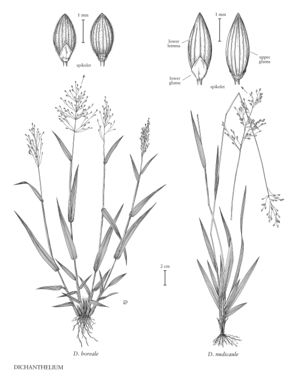Difference between revisions of "Dichanthelium nudicaule"
FNA>Volume Importer |
imported>Volume Importer |
||
| (4 intermediate revisions by 2 users not shown) | |||
| Line 7: | Line 7: | ||
|synonyms={{Treatment/ID/Synonym | |synonyms={{Treatment/ID/Synonym | ||
|name=Panicum nudicaule | |name=Panicum nudicaule | ||
| − | |authority= | + | |authority= |
| + | |rank=species | ||
}} | }} | ||
|hierarchy=Poaceae;Poaceae subfam. Panicoideae;Poaceae tribe Paniceae;Dichanthelium;Dichanthelium sect. Nudicaulia;Dichanthelium nudicaule | |hierarchy=Poaceae;Poaceae subfam. Panicoideae;Poaceae tribe Paniceae;Dichanthelium;Dichanthelium sect. Nudicaulia;Dichanthelium nudicaule | ||
| Line 19: | Line 20: | ||
-->{{Treatment/Body | -->{{Treatment/Body | ||
| − | |discussion=<p>Dichanthelium nudicaule is a rare species that grows in wet pine savannas, bogs (including Sphagnum mats), and the margins of cypress swamps in eastern Louisiana, southern Mississippi and Alabama, and western Florida. Vegetatively, it exhibits traits of D. laxiflorum, but its spikelets resemble those of small plants of D. scabriusculum, which are fairly widespread in similar habitats of the Gulf coastal plain. Dichanthelium nudicaule is protected by U.S. federal law.</p> | + | |discussion=<p><i>Dichanthelium nudicaule</i> is a rare species that grows in wet pine savannas, bogs (including <i>Sphagnum</i> mats), and the margins of cypress swamps in eastern Louisiana, southern Mississippi and Alabama, and western Florida. Vegetatively, it exhibits traits of <i>D. laxiflorum</i>, but its spikelets resemble those of small plants of <i>D. scabriusculum</i>, which are fairly widespread in similar habitats of the Gulf coastal plain. <i>Dichanthelium nudicaule</i> is protected by U.S. federal law.</p> |
|tables= | |tables= | ||
|references= | |references= | ||
| Line 28: | Line 29: | ||
-->{{#Taxon: | -->{{#Taxon: | ||
name=Dichanthelium nudicaule | name=Dichanthelium nudicaule | ||
| − | |||
|authority=(Vasey) B.F. Hansen & Wunderlin | |authority=(Vasey) B.F. Hansen & Wunderlin | ||
|rank=species | |rank=species | ||
| Line 35: | Line 35: | ||
|basionyms= | |basionyms= | ||
|family=Poaceae | |family=Poaceae | ||
| − | |illustrator=Linda A. Vorobik | + | |illustrator=Linda A. Vorobik;Hana Pazdírková |
| + | |illustration copyright=Utah State University | ||
|reference=None | |reference=None | ||
|publication title= | |publication title= | ||
|publication year= | |publication year= | ||
|special status= | |special status= | ||
| − | |source xml=https:// | + | |source xml=https://bitbucket.org/aafc-mbb/fna-data-curation/src/200273ad09963decb8fc72550212de541d86569d/coarse_grained_fna_xml/V25/V25_1185.xml |
|subfamily=Poaceae subfam. Panicoideae | |subfamily=Poaceae subfam. Panicoideae | ||
|tribe=Poaceae tribe Paniceae | |tribe=Poaceae tribe Paniceae | ||
Latest revision as of 17:56, 11 May 2021
Plants cespitose, clumps with few culms. Basal rosettes somewhat differentiated; blades lanceolate. Culms 20-60 cm, with caudices, slender, glabrous, weakly ascending, with a tuft of predominantly basal leaves, only the upper 3 internodes elongated; fall phase rarely branching, branches, if present, from the basal and sub-basal nodes, erect. Cauline leaves 3-4; sheaths longer than the internodes, lower sheaths sparsely ascending to spreading-pilose, upper sheaths somewhat elongate, striate, glabrous, lustrous; ligules usually 0.5-1 mm, membranous, ciliate; blades 2-20 cm long, 3-10 mm wide, mostly basal, ascending to erect, widest near midlength, flat to stiffly involute, tapering basally and partly encircling the culm, glabrous, blades of the flag leaves distant from and much smaller than those below. Primary panicles 2-7 cm long, almost as wide when expanded, long-exserted, sparse; branches few, ascending to spreading, glabrous or scabridulous. Spikelets 2.4-3.2 mm long, usually less than 1 mm wide, narrowly ellipsoid to ovoid, often purplish-stained, glabrous. Lower glumes less than 1/3 as long as the spikelets, acute; upper glumes and lower lemmas clearly longer than the upper florets, prominently veined, apices acuminate and usually beaked; lower florets sterile; upper florets about 2 mm long, about 1 mm wide, ellipsoid, acute. 2n = unknown.
Discussion
Dichanthelium nudicaule is a rare species that grows in wet pine savannas, bogs (including Sphagnum mats), and the margins of cypress swamps in eastern Louisiana, southern Mississippi and Alabama, and western Florida. Vegetatively, it exhibits traits of D. laxiflorum, but its spikelets resemble those of small plants of D. scabriusculum, which are fairly widespread in similar habitats of the Gulf coastal plain. Dichanthelium nudicaule is protected by U.S. federal law.
Selected References
None.
